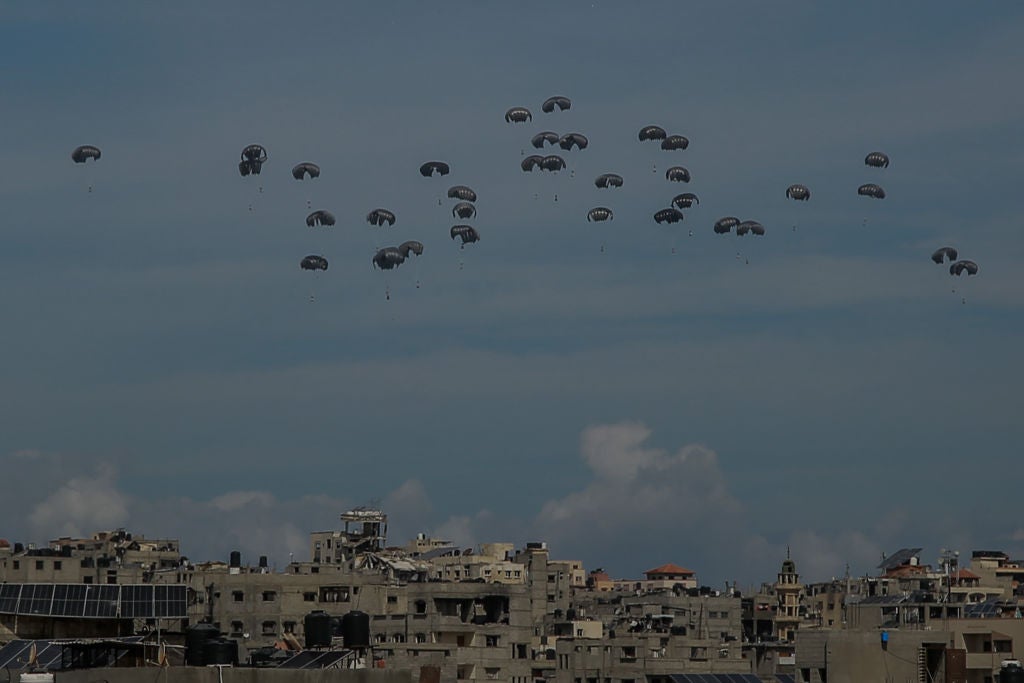
More than 1,000 American troops will be needed to build the military’s planned temporary port off the coast of Gaza for bringing in aid. That’s according to the Pentagon, which said the effort will take time — approximately 60 days to complete.
The planned maritime port was announced this week, with President Joe Biden detailing it at the State of the Union on Thursday, March 7. On Friday, Pentagon spokesman Gen. Pat Ryder elaborated on details, saying the temporary pier will take close to two months to actually be built and made operational. That’s with the U.S. military “starting immediately” in mobilizing resources for the effort.
“[…] we anticipate that it’ll take over 1,000 U.S. forces to participate in building this capability,” Ryder said. “As far as timeframe, as I mentioned, several weeks, likely up to 60 days in order to deploy the forces and construct the causeway and the pier.”
The plan calls for using joint logistics over-the-shore (JLOTS) equipment, something that the U.S. Army and Navy already utilize. According to the proposed plan, this infrastructure would let American troops ship in as much as 2 million meals per day to Palestinians in Gaza. The U.S. and partner nations and non-governmental organizations will be working together on this; in part this will mean, according to the plan, no troops will actually set foot into the Gaza Strip, instead passing the aid to trusted partners on the ground.
“[…] they’ll establish a temporary offshore maritime pier that allows for shipping vessels to transfer cargo to smaller vessels to transport and offload cargo to a temporary causeway for the delivery of humanitarian aid to Gaza,” Ryder said.
Subscribe to Task & Purpose Today. Get the latest military news and culture in your inbox daily.
The Pentagon’s comments come after the American military conducted its fourth round of airdrops of aid into Gaza. An Air Force C-130 cargo plane, carrying food provided by the Royal Jordanian Air Force, dropped more than 11,500 meals into the north of Gaza. The military described the drop as “critical aid.” The amount of food distributed by the airdrops has been criticized by advocacy and humanitarian groups such as Oxfam as insufficient; Gaza has a population of more than 2 million people, and the MREs provided only cover a day at most for a fraction of that population. The Department of Defense said that it intends to carry out more airdrops in the coming weeks.
Alongside medical need, Palestinians in Gaza are on the verge of famine. The United Nations reports that hundreds of thousands of people in the territory are facing malnutrition. More than a dozen children have already died of starvation since the war began; a wider U.N. report on famine in Gaza is expected this month. Since the Oct. 7 terror attacks inside Israel by Hamas and the start of the war in Gaza, a total of more than 32,000 people have died in Israel and the occupied Palestinian territories, at least 30,878 of those in Gaza. That includes at least 12,300 children killed in Gaza.
If the port is successfully built, timeline regardless, it remains unclear how much aid will get through. Ground-based aid transports into the occupied territory have been often blocked at the borders by Israeli and Egyptian security forces. The United Nations’ stance is that ground transports are more effective and efficient than airdrops. When asked on Friday, Ryder said that he is “not tracking any” restrictions.
The U.S. and Jordan are not alone in airdropping aid into Gaza while ground transports remain mostly blocked. Egypt and the United Arab Emirates are among other nations who are sending food via the skies. At least five people were killed on Friday by an aid package delivered from the sky; the parachute failed to properly open and fell hard to the ground, hitting people gathered trying to reach needed food. The United States denied that it was one of its aid packages.
The latest on Task & Purpose
- Sailors at Norfolk will be locked out of their rooms if they fail inspection
- Army Reserve colonel allegedly pocketed $62,000 in fake rental property scheme
- Army quietly dropped 5-mile run requirement from airborne school in 2018
- Alaska paratroopers get a secret weapon for the arctic: beards
- Army will add 17 air defense units while cutting 24,000 active duty spots
